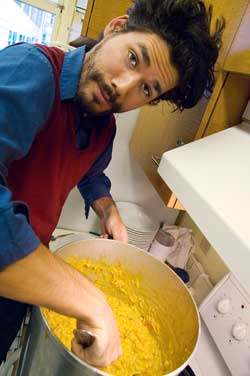Faiths make connections

The Multi-Faith Chaplaincy offers students vegan meals through Mother Hubbard’s Cupboard. Students can use the time for discussion and networking. Above, volunteer Carlos Guillermo Proto gets cooking.
photo by Rob Maguire
When horrible things happen — bridges collapse or shooters enter schools — many of us try to make sense of the situation. We also think about our own mortality.
Ellie Hummel, ecumenical chaplain at the Multi-Faith Chaplaincy, was right there, alongside the student union, Health Services and Counselling and Development, when Dawson students were displaced here a month ago. “Many of them were asking what makes a person do that, and what could have been done to prevent it.”
Hummel has been with the chaplaincy for seven years and its coordinator for the last year. The chaplaincy provides a variety of programs, such as a peer support program, a student emergency food fund, volunteer opportunities in the community, workshops, meditations, retreats religious/spiritual programming and guidance. They also offer a multi-faith convocation celebration in the spring. “We’re a service department that looks at life through the lens of spirituality,” Hummel said.
The Chaplaincy is moving in a new direction, with an increased, deeper focus on interfaith dialogue and programming.
Arianne Shaffer is responsible for liaising with the 10 or so spiritual and religious student groups at Concordia. This has led to a new program through the chaplaincy, Inter-faith Connections.
“Two students approached me during the summer, they were concerned about the conflict in Lebanon and what would happen on campus,” Shaffer said.
Initially they considered a round-table or conference, “but we realized we didn’t want an academic dialogue and were interested in something more heart-based.”
Eventually, a group with student representatives from Judaism, Christianity and Islam was formed to develop the idea. Their program allows students from different faiths to experience each others’ religious traditions. Interested students can attend (and participate in, if they choose to) the prayer services and Iftar, breaking of the Ramadan fast, on Oct. 15 at a west island mosque. Interfaith Connections is planning debriefing sessions both before and after the events where students can discuss “what was challenging, and what was meaningful for them”.
In the same spirit, students can attend a church service in NDG on Nov. 5, and an Erev Shabbat dinner will be held later that month. “We recognize that these are just small slices of the religions we are exploring this semester,” Shaffer acknowledged. She added that the program will eventually expand to include other religious traditions.
Hummel is excited about the project. “We want to provide an opportunity to speak across cultures. People are really anxious about spirituality and they welcome the opportunity to discuss it.”
She recognizes that some people are suspicious about the chaplaincy, “Religion often gets bad press. A lot of bad has been done in the name of religion, but a lot of good as well.”
Those who want to participate in the Interfaith Connections program should contact Arianne Shaffer at ashaffer@alcor.concordia.ca